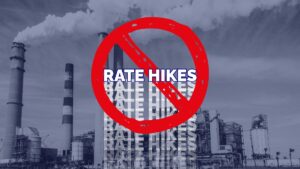
NC Governor Josh Stein announces statewide eligibility for home efficiency program
Energy Saver NC, which has $208 million of funding through 2031, provides two types of rebates to eligible households.

Energy Saver NC, which has $208 million of funding through 2031, provides two types of rebates to eligible households.

With utilities giant Duke Energy demanding yet another rate hike despite making billions in profits, it’s worth noting that there are other electricity providers in North Carolina. In fact, there are 26 not-for-profit electric cooperatives providing electricity to 2.8 million North Carolinians across 93 counties in the state.

“Duke Energy’s proposed rate hike is simply too high and comes as the company is also retreating on more affordable clean energy. At a time when families are struggling to make ends meet, we should be doing everything we can to make life more affordable, not less. I will continue to fight on behalf of every North Carolinian to lower costs and grow the economy,” said Stein.

North Carolina Democrats on the state and federal levels are pushing a range of grants, initiatives, and legislation to support the state’s ongoing Hurricane Helene recovery efforts.

“My office is intervening to make sure we find the right balance between investing in our energy infrastructure and protecting North Carolinians’ wallets,” AG Jackson said in a statement released earlier this month.

“Thousands of families were going to have the option to install solar power, save money, and have another energy option after a major storm. Now the EPA has illegally cancelled those funds – so I’m going to court to bring $150 million back to our state,” Jackson said in a press release.

“Duke has eliminated wind, reduced solar, and delayed nuclear while increasing our dependence on price-volatile natural gas and coal. Duke Energy is retreating from the state’s clean energy future that can continue to bring good jobs and lower costs to North Carolina.”

Earlier this year, the Republican-led legislature in North Carolina eliminated the state’s carbon emissions reduction target for 2030 and allowed Duke Energy to charge consumers for the cost of gas and nuclear power plants before they are even operational.

According to an analysis from Energy Innovation, the OBBBA would drive up the average household energy costs by $220 in 2030 and nearly $490 in 2035. In addition, the federal bill is expected to cut over 41,000 jobs from North Carolina’s workforce in 2030 and another 32,000 jobs by 2035.

The One Big Beautiful Bill Act, President Trump’s signature budget bill, will lead to higher energy costs and a stifled clean energy industry in North Carolina, according to clean energy experts.